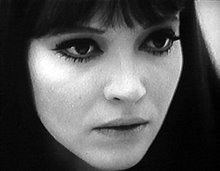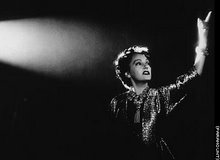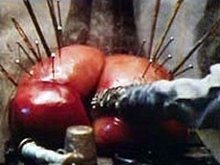




Above, portraits of some of the writers discussed below: Saint Augustine, Jean-Jacques Rosseau, Frederick Douglass, William Wordsworth, Shelley Jackson.
The autobiography as we know it is a relatively recent literary invention. Although human beings have probably always recorded accounts of their lives---cave painting hand outlines could be read as primal form of autobiography---the term autobiography, as well as the idea of telling the story of your life for no other reason than to "express yourself," only appears in the Western tradition in the 18thC. And the main reason for this is that the modern idea of "the self" is a pretty modern concept, too.
Before you can imagine the autobiography, a certain idea of the self has to be in place: "self" as an independent entity important for its own sake. Thus, not only are the lives of the Famous and Powerful (biography) worth recording and reading, but anyone's life has the potential to disclose something worthwhile and meaningful to others. Broadly speaking, this only happens in Western European history with the birth of modern secular society. Liberating the self from a position of subordinance under God, Priests, the King, and so on, the modern notion of the self defines "the human" as something naturally free, autonomous, independent, governed by reason, and possessing a universal worth or dignity.
While some earlier written forms seem to correspond to the autobiography, works like Saint Augustine's Confessions (397) were created for other purposes than only to relate the details of a particular man's life. While Augustine does write a great deal about his circumstances, the point of his book is his eventual conversion to Christianity and its true subject is man's relation to God, not man himself.
One of the first "true" autobiographies is Jean-Jacques Rousseau's Confessions (1782). His use of a title with religious associations was meant to signal a new form of "confession:" not a recital of spiritual sins but an examination of human subjectivity, an exegesis on how the self develops. In the Age of Enlightenment, the autobiography came to stand as the human document par excellance, the literary form which most celebrated that which was human and explained why such concepts as "human rights" and "human worth" should be at the center of political, philosophical and moral inquiry.
Its easy to see why the autobiography came to play such an important role in the 19thC struggle against slavery. In his famous work The Narrative of the Life of Frederick Douglass (1845), former slave Douglass dares to stake his, and by extension all slaves, claim to humanity upon the very literary ground which was understood to define "the human." The very act of writing his autobiography demonstrated his possession of an independent and rational self with as much claim to human rights as any other.
One of the essential "human" elements of the autobiographical form is its close correspondence to the act of remembering---it is, after all nothing more than a collection of memories. The relationship between autobiography and memory is often part of the story told itself. William Wordsworth's long autobiographical poem, The Prelude (which he worked on for most of his adult life and was only published in 1850 after his death) is devoted to a series of ever deepening explorations of what he called "spots of time," moments that first appear to have no great significance but are in fact touchstones for intense memories:
There are in our existence spots of time,
Which with distinct pre-eminence retain
A renovating Virtue, whence,
... our minds
Are nourished and invisibly repaired;
...Such moments
Are scattered everywhere, taking their date
From our first childhood.
(Book XII, 208-225)
Wordsworth's "spots of time" are individual past experiences through which he can later discern his development as both a poet and a man, moments which come to have new and deeper meanings as he returns to them years later in memory (much like Terence Davies in Distant Voices/Still Lives).
While autobiography is conventionally thought of as a nonfiction literary form, as a narrative it betrays its status as something consciously crafted, designed and made. It is not synonymous with a person's actual life, it is an edited version of it. And since autobiographies are the stories of people's lives, they include the fictions that are part of those lives: dreams, memories, fears and beliefs.
An interesting autobiography to take a look at in relation to Tarnation might by the hypertext "My Body: A Wunderkammer," by Shelley Jackson. Digital hypertext is make up out of textual fragments or lexia that can be accessed by readers in various and random order. Hypertext's potential for expanding narrative modalities---exploding linearity----has made it an interesting medium for contemporary writers like Jackson who often make the material textuality of their work a significant factor in it (see for example, her ongoing project Skin, subtitled "a mortal work of art," which is a narrative being published one word at a time on the skin of 2095 volunteers, of which I am one).
































2 comments:
That skin project is amazing! I just clicked the link. That's such a creative idea...and it's so great how many people are doing it. It's like a painting that tells a story. Each person is an important role. I wish i had ideas like that!
I'm a "the"
There are lots of us.
I haven't got the tattoo yet, though.
Post a Comment